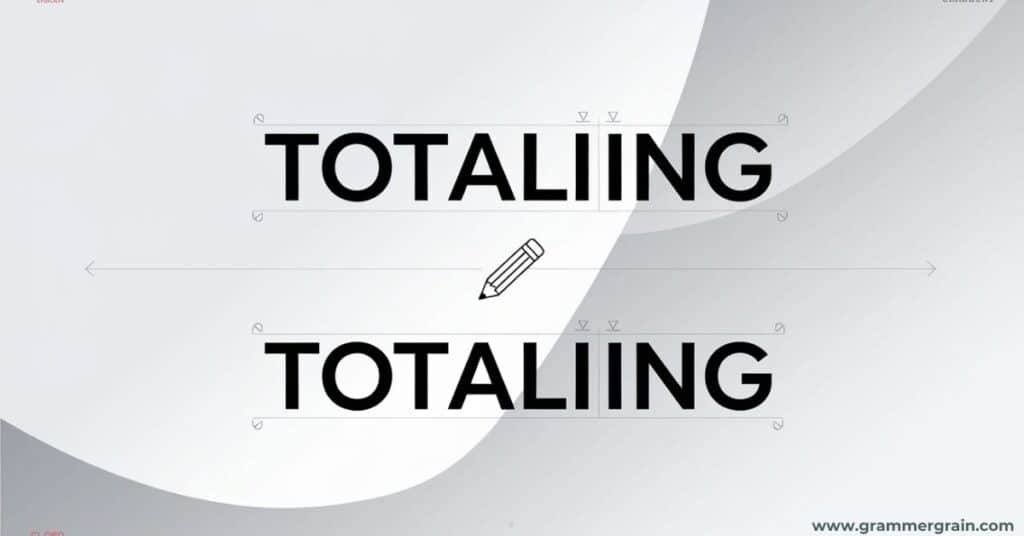When it comes to the spelling of totalling versus totaling, the answer depends on where you’re located. Totalling is the preferred spelling in British English, while totaling is the correct choice in American English.
But why do these spelling differences exist, and how do they affect your writing? Understanding this subtle distinction can make a big difference in how your message is received, especially if you’re writing for international clients or audiences. Ever wondered why English has so many spelling variations? This article will clear up the confusion between these two forms and provide practical tips for using them correctly, depending on your region.
Keep reading to find out!
What Do “Totalling” and “Totaling” Mean?
Both totalling and totaling are verbs that refer to the action of adding up or calculating a total. Whether you are summing the figures of an accounting report or calculating the score of a game, these words capture that process.
For instance, you might say, “The accountant is totalling the expenses,” or “He is totaling the revenue for this quarter.”
However, the difference is purely spelling-based rather than meaning-based. In British English, the preferred spelling is totalling, while totaling is used in American English.
This distinction is part of broader regional variations in spelling between the two forms of English.
What Do “Totalling” and “Totaling” Mean?
The confusion between totalling and totaling exists because both forms are correct but used in different regions.The confusion arises from the different conventions followed by British and American writers.
In general, British English retains the traditional spelling rules, which include doubling the consonant before adding “-ing” in verbs with a stressed syllable, such as totalling and travelling.
On the other hand, American English tends to simplify these spellings by dropping the extra “l,” resulting in totaling and traveling.
This pattern is consistent across many words and reflects the overall effort by Noah Webster, the famed American lexicographer, to simplify American spelling in the 18th century.
Historical Roots: Noah Webster
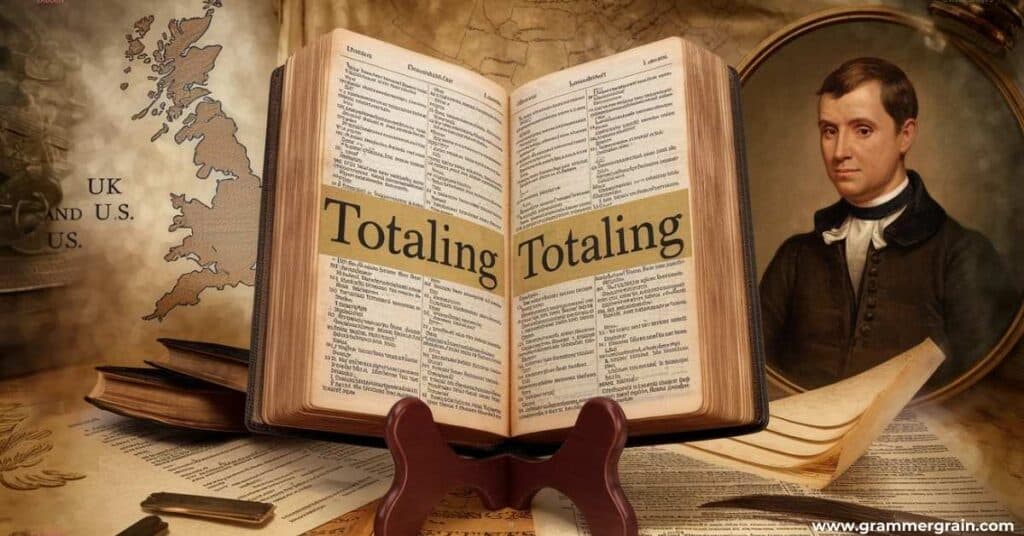
To understand the difference between totalling and totaling, it’s helpful to look at the historical context.
Noah Webster, a key figure in shaping American English, pushed for spelling reforms that would make English easier to learn and more distinct from British norms.
As a result, many of the American English spellings we use today, such as color instead of colour and theater instead of theatre, were popularized by Webster’s dictionary.
Webster’s influence is also seen in the simplification of many verbs. In his quest to reduce unnecessary letters, he advocated for dropping double consonants when adding “-ing” to verbs.
So, while British English maintained totalling, American English adopted totaling as the standard.
Regional Spelling Differences: British vs American
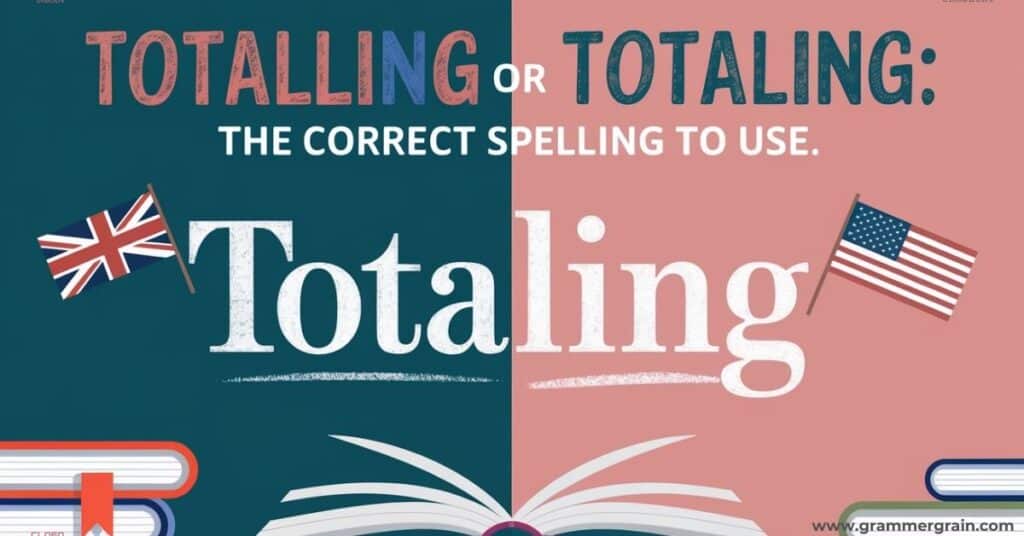
The contrast between British English and American English is not just limited to totalling and totaling. It extends to other common words as well.
Here’s a quick overview of how these two variants differ in terms of spelling:
| Word | British English | American English |
|---|---|---|
| Total | Totalling | Totaling |
| Travel | Travelling | Traveling |
| Centre | Centre | Center |
| Colour | Colour | Color |
| Theatre | Theatre | Theater |
This list highlights how spelling conventions differ between the two versions of English.
While British English follows more traditional spelling rules, American English tends to streamline them.
Etymology of Totalling and Totaling
The word “total” comes from the Latin word “totalis,” meaning whole or entire. This Latin root is the basis for the word in both British and American English.
Over time, total became used to describe the sum or aggregate of something, and the form totalling (or totaling) emerged as the present participle.
The transition from totalling to totaling is tied to the overall trend of simplifying spelling in American English. This shift is part of a broader effort to make the language more accessible and easier to write.
While the root word remains the same in both versions, the spelling differences are due to historical and regional influences.
Synonyms of Totalling and Totaling
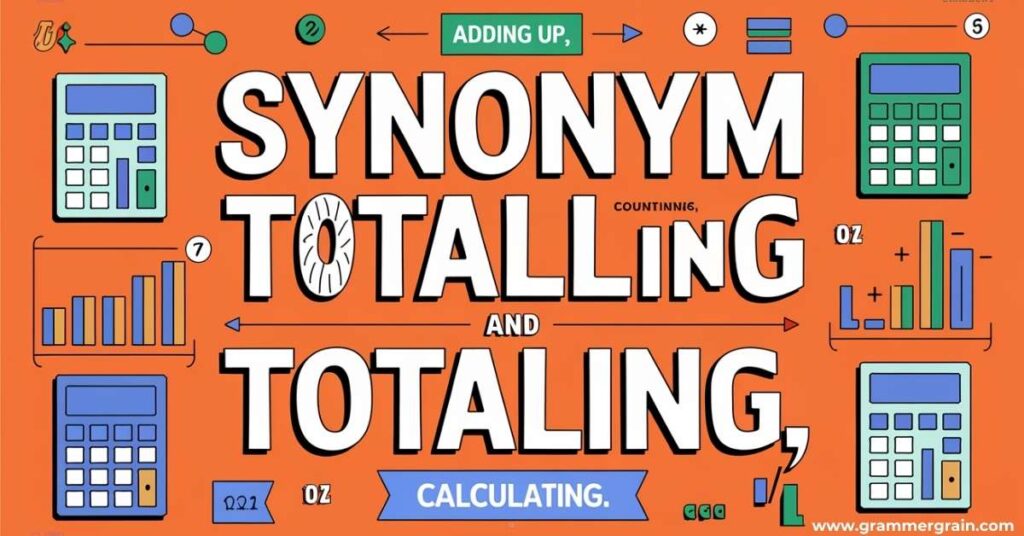
There are a number of synonyms for totalling and totaling that can be used depending on the context. Some of the most common include:
- Adding up
- Summing
- Tallying
- Counting
- Calculating
- Tabulating
- Aggregating
- Computing
For example, instead of saying, “She is totalling the sales for the month,” you might say, “She is adding up the sales” or “She is computing the final figures.”
These synonyms serve to convey the same idea but allow for variety in writing.
It’s important to note that while these words are synonymous, they might be used in slightly different contexts.
For instance, tallying is often associated with counting items one by one, while aggregating is more commonly used in data analysis contexts.
Key Differences Between Totalling and Totaling
The primary difference between totalling and totaling is the spelling rule that applies to each. As noted, British English uses totalling, which follows the traditional rule of doubling the final consonant when adding “-ing.”
In contrast, American English simplifies the spelling, using totaling without the extra “l.”
In addition to the spelling, usage varies regionally. American English is generally more consistent in its simplifications, while British English tends to retain older conventions.
Both forms are used in their respective countries, so it’s important to follow the appropriate convention based on your audience.
Usage Across Regions: British and American Practices
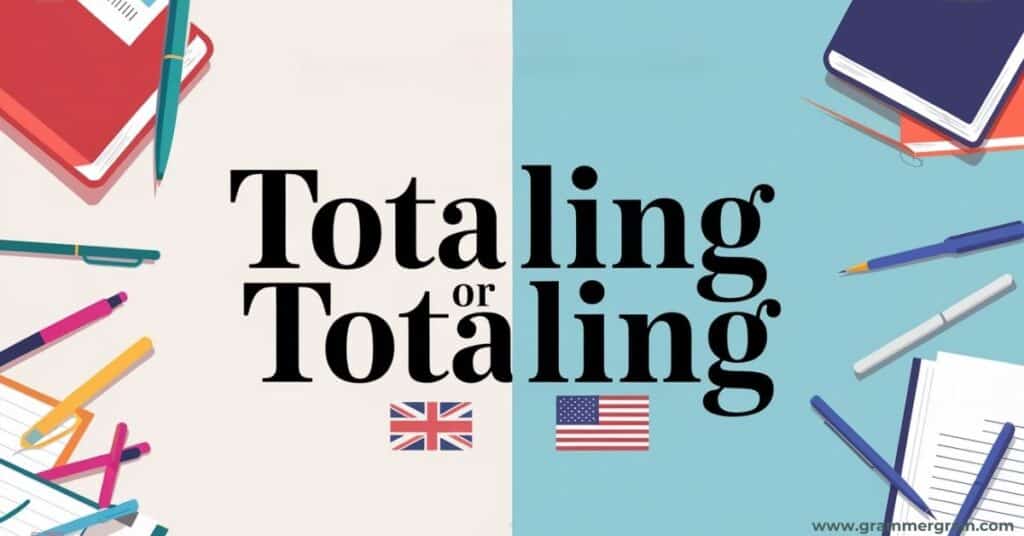
When it comes to writing or communication, it’s crucial to understand the regional variations in spelling between British and American English.
For example, a professional document intended for a British audience should use totalling, while a report aimed at an American audience would use totaling.
Organizations and brands that operate globally often face challenges in maintaining consistency in their written communications.
For instance, global companies may need to adjust their spelling based on the region where the communication is directed.
Websites, advertisements, and internal documents may need to be tailored to different audiences, with the correct spelling used according to regional norms.
Writing to a British Client: A Sample Email
Dear Sir/Madam,
I hope this message finds you well. We are currently totalling the final figures for your project and will have a comprehensive report ready for your review by the end of the week. Should you have any questions, feel free to reach out.
Best regards,
[Your Name]
This email uses totalling in accordance with British English conventions. If the client were American, the spelling would shift to totaling, but the meaning remains the same.
Writing to an American Client: A Sample Email
Hello [Client Name],
I’m writing to update you that we are totaling the figures for your report and expect to have everything finalized by Friday. If you need any additional information, don’t hesitate to let me know.
Best regards,
[Your Name]
Here, the totaling spelling follows the American English style. Notice how the content is the same, but the spelling changes based on the regional spelling preference.
Example Scenario: Accounting Report
Imagine an accountant preparing a financial report. If this report is intended for a British company, they would write, “We are totalling the sales for the quarter.”
On the other hand, an American accountant would write, “We are totaling the sales for the quarter.”
While the word choice may differ, the meaning remains identical. The only real change is the spelling, which varies depending on whether the audience follows British or American English conventions.
How to Choose the Correct Writing Conventions: Totalling or Totaling
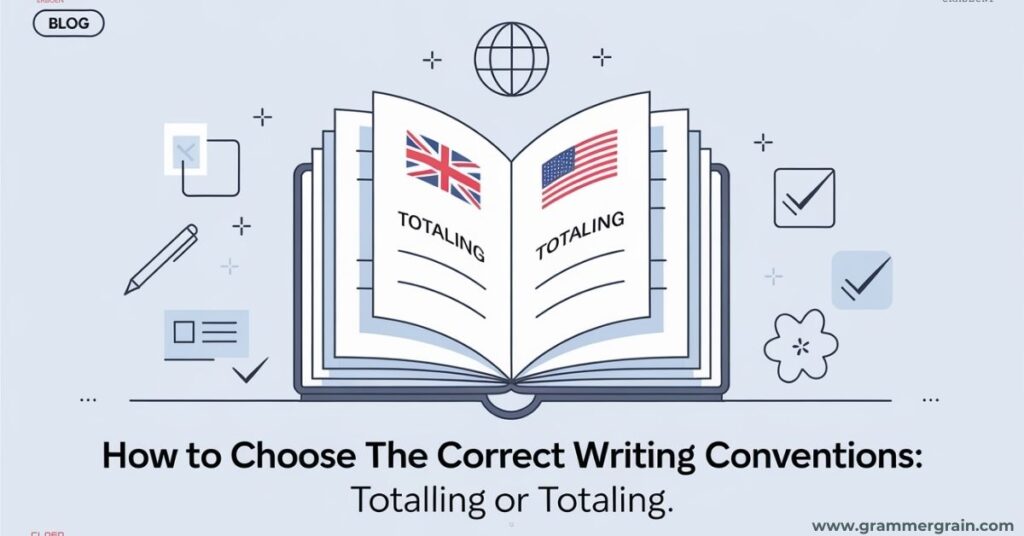
Choosing the correct spelling between totalling and totaling depends on your target audience. For instance, if you’re communicating with people in the United Kingdom, totalling is the correct spelling.
On the other hand, if you’re writing for an American audience, you should use totaling.
If you’re writing in a formal context, it’s important to be consistent throughout your document. Choose one form and stick with it.
Don’t switch between totalling and totaling in the same piece of writing, as this can cause confusion.
Trick to Remember the Difference
A simple trick to help you remember which spelling to use is to think of the “L” in totalling as standing for “London,” the capital of the United Kingdom.
For totaling, the single “L” can stand for “Less,” indicating the simplified spelling used in American English.
This trick helps reinforce the spelling differences based on geography. If you’re writing for a British audience, you’ll want to use totalling, and if you’re writing for an American audience, you’ll go with totaling.
Conclusion
Both totalling and totaling are valid, but your choice depends on the region you’re addressing. British English uses totalling, while American English prefers totaling.
Understanding these regional differences in spelling will help you communicate more effectively, whether you’re writing an email to a client or preparing a report for your boss.
Ultimately, consistency is key. Choose the correct spelling based on your audience, and make sure to apply it consistently throughout your writing. With this knowledge in hand, you’ll no longer have to worry about whether to use totalling or totaling—you’ll know exactly which one is right for any situation.
FAQs
1. What is the correct spelling, totalling or totaling?
The spelling totalling is used in British English, while totaling is the preferred spelling in American English. The main difference is based on regional variations in English.
2. Can you use totalling in a sentence?
Yes, here’s an example: “She was busy totalling the expenses for the event.” It refers to the act of adding up or summing something.
3. What does totalling mean in accounting?
In accounting, totalling refers to the process of adding up figures to find a sum or final total, such as in financial reports or balance sheets.
4. What is the past tense of total?
The past tense of total is totaled in American English and totalled in British English. For example, “The report was totaled yesterday.”

Taila Lucy, an expert content writer at Grammar Grains, brings 4 years of experience crafting engaging pieces on grammar. Her work delves into synonyms, antonyms, slang, puns, and poetry, helping readers master English with creativity and flair.
